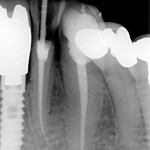
Root canal treatment is very common with a recent review indicating that worldwide about 8% of teeth are root filled (Dental Elf – 21st Sep 2022). While root canal treatment success rates are high failure do occur and can be managed with non-surgical retreatment of using apical surgery. A 2016 Cochrane review by Del Fabbro et al (Dental Elf – 24th Oct 2016) found no clear evidence of superiority for surgical or non-surgical approaches.
The aim of this review was to assess, in terms of clinical- and patient-related outcomes, the effectiveness of apical surgery compared with non-surgical root canal treatment or retreatment in managing teeth with apical periodontitis.
Methods
A protocol for the review was registered on the PROSPERO database. Searches were conducted in the Medline, Embase, Scopus, Cochrane Central Register of Controlled Trials (CENTRAL), DART-Europe E-theses Portal (DEEP) and British Library E-Theses Online Service (EThOS) databases. This was supplemented by searches of the journals, International Endodontic Journal, Journal of Endodontics, Journal of Clinical Periodontology, Journal of Dental Research, Journal of Dentistry, Clinical and Oral Investigation, Journal of Oral and Maxillofacial Surgery, International Journal of Oral and Maxillofacial Surgery, British Journal of Oral and Maxillofacial Surgery, Australian Endodontic Journal. Randomised controlled trials (RCTs) non-randomized clinical trials (CCTs)retrospective and prospective comparative cohort and case–control studies involving more than 20 patients with a minimum of 1 year follow-up and published in English were considered. The main outcome was tooth survival, other outcomes included pain, tenderness, swelling, need for medication (analgesics, antibiotics), presence of sinus tract, hard and soft tissue healing, radiological evidence, oral health-related quality of life (OHRQoL) tooth mobility and adverse effects. Two reviewers independently extracted data and assessed risk of bias using the Cochrane RoB2 for RCTs, ROBINS-I for CCT and the Newcastle-Ottawa scale for observational studies. A narrative summary was undertaken and meta-analyses if more than 3 comparable studies were available.
Results
- 5 studies (2 RCTs, 2CCTs, 1 retrospective cohort) involving a total of 529 teeth were included
- 4 studies had a high risk of bias and one an unclear risk.
- Follow-up periods ranged from 6 months to 8.7 years.
- The treatment/retreatment group required more additional intervention (18.31%) than the surgery group (7.1%).
- 96% of the teeth in the surgery group and 11.81% of teeth in the treatment/retreatment group were extracted.
- 82.9% of the teeth in the surgery group and 77% of teeth in the treatment/retreatment group showed complete or partial healing of periapical lesions.
- Meta-analysis was not conducted due to study heterogeneity.
Conclusions
The authors concluded: –
Apical surgery showed seemly better results regarding periapical healing, reduced need for more and further intervention and less issues with OHRQoL, although tooth survival was higher in the control group. Overall, all the review findings should be taken with caution, as they are mostly based on high risk of bias studies. Evidence is insufficient to advice clinicians on which treatment option achieves the best results. Hence, clinicians can only base their clinical decision-making on evidence derived from single clinical trials, or their own experience and patients’ preference.
Comments
The authors have adopted a good methodological approach, registering a protocol and undertaking an extensive search of major databases. This was supplemented by hand searching and grey literature searched however restriction to studies in English excluded at least one study. Only 2 of the 5 studies included in the review were RCTs compared with the 2016 Cochrane review by Del Fabbro et al (Dental Elf – 24th Oct 2016) which included 20 RCTs. The Cochrane review focused exclusively on retreatment of teeth with apical periodontitis while the question addressed by this review appears broader however only one of the studies included in the Cochrane review is included in this new review. This review does include 2 studies published since the Cochrane review but only one of this is a RCT. The Cochrane review concluded,
Available evidence does not provide clinicians with reliable guidelines for treating periapical lesions. Further research is necessary to understand the effects of surgical versus non-surgical approaches, and to determine which surgical procedures provide the best results for periapical lesion healing and postoperative quality of life.
This new review seems to suggest that a surgical approach is better, however almost all of the included studies are at high risk of bias so the findings should be very cautiously. What is clear is that high quality well reported studies using standard outcome measures are needed to improve the quality of evidence on this topic.
Links
Primary Paper
Bucchi C, Rosen E, Taschieri S. Non-surgical root canal treatment and retreatment versus apical surgery in treating apical periodontitis: A systematic review. Int Endod J. 2022 Jun 28. doi: 10.1111/iej.13793. Epub ahead of print. PMID: 35762859.
Other references
Dental Elf – 21st Sep 2022
Dental Elf – 24th Oct 2016
